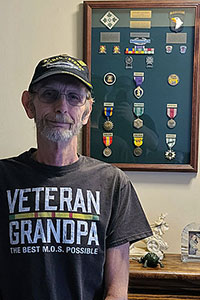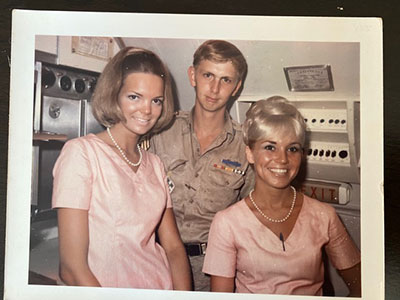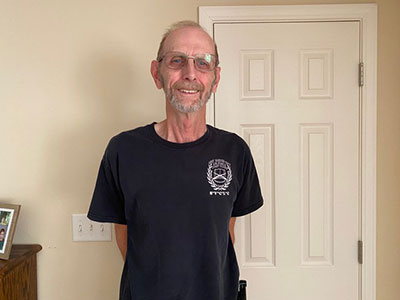Army Vietnam War Lindenhurst, IL Flight date: 10/19/22
By Wendy L. Ellis, Honor Flight Chicago Veteran Interview Volunteer
There’s nothing like a spur of the moment decision to change your life. High school wasn’t working out for Ed Helrigel, and as he walked home one fateful day, he passed an Army recruiting office. “I walked about a half block, turned around and went in and joined the Army,” says Helrigel. “Spur of the moment, no thought at all. I volunteered for the airborne infantry and Vietnam.” It was summer of 1966. He was just 17.
The airborne infantry never happened. The Army wanted him to be a truck driver, but he nixed that idea. So they sent him to cooking school at Fort Dix before shipping him to Vietnam. He ended up running the officers’ mess. Over time, many of the friends he’d made on the trip aboard the USS Upshur were out on the front lines getting injured or killed, and it made him uncomfortable. “I didn’t feel right being in the back while they were out there fighting.” So he volunteered to be out there with them, and the Colonel obliged. Twenty minutes later, he joined up with Delta Company on the front lines. Still 17 when he arrived in Vietnam, he turned 18 a week and a half later.
Helrigel was a rifleman/machine gunner in the infantry from October to July of the following year. His unit, the 3rd Brigade, became a task force that was in constant demand as a heavy combat unit. “We kept getting transferred to all different areas of the Highlands. We were a quick reaction force. If there was a big battle going on, they would drop us into that battle and we were expected to kick ass and take names.” He saw a lot of combat during his first year in Vietnam, including the Tet Offensive, in February of 1968. They were dropped onto Fire Base Hardcore, right at the edge of the mountains south of Da Nang, where intelligence told them 1 to 2 reinforced regiments of Viet Cong were in the valley. “We were supposed to go down and eliminate them. But our intelligence was a bit off. They sent our 300-400 man brigade in and we ran into an NVA division that outnumbered us almost 8 to 1. That was one of our worst battles. It lasted about 2 weeks. My company went in with 120 guys and we walked out with about 23.”
Oddly, Ed’s brigade won that battle, and Helrigel credits the fire support they got with the win. There was artillery, with strikes from the air force and naval bombardments. “If it wasn’t for that, we probably would have gotten wiped out,” says Helrigel. “The night before that battle ended, we all laid our ammo out and said goodbye to each other cause we knew we weren’t going to see the sun come up.”
As he neared the end of his first tour of duty, Helrigel found his team dropped onto LZ Brillo Pad, near the Cambodian border. “Some guy landed on that firebase and said, ‘You’re going to have to be tougher than a Brillo pad to hold this,’” says Helrigel. He was right. It wasn’t until Brillo Pad that his unit got the replacements for the 74 soldiers they’d lost in the Tet Offensive. That was a good thing since they got hit with two regiments of NVA in a battle that lasted 3 weeks. “We were receiving 300 to 400 incoming rounds every day, mortar, artillery, rifle fire and quite a few human wave attacks,” says Helrigel. “I was stupid. I was taking a lot of risks, a lot of chances. I was a machine gunner in that firefight.”
But he survived that first year, even making Sergeant E5 at the age of 18. In fact, the Army plucked him from the midst of battle when his time was up, and within 72 hours he found himself at O’Hare Airport in Chicago. “How can you take that transition? You can’t,” says Helrigel. “You took that combat readiness back to civilian life and you had to bury it. You got spit on, were put down, called baby killers and you had to bury all those emotions. You became hard.” Helrigel was sent to El Paso, TX. where he and his friends spent 4 hours a day working and the rest of the time partying. He admits it wasn’t a good combination. Too much drinking and partying would lead to trouble, so Helrigel eventually volunteered to go to Germany. But there he found a love of German Beer, and too many bars.
“I have to admit, I had a good time the whole six years I was in the military,” says Helrigel. “But I felt out of place. When I first got out of Basic Training and went straight to Vietnam, that puts you in a different mind set. You only end up taking a bath once every 3 or 4 weeks and that was only when you went back to get refitted. You wore the same clothes all the time. You shave only when you can find water.. You called the officers Lieutenant or Captain. You could sit down, relax and have a drink with them. But then when you went back to the civilian version of the military in the U.S. and Germany, all of a sudden you had to have spit-shined shoes. My uniform had to be exactly starched. You could almost cut your finger on the starch in your pants. That was very hard; you got so used to not being able to have to do all that, so after two years of garrison soldiering, I actually felt more comfortable back in combat.



So Ed volunteered to go back to Vietnam where he joined the 101st Airborne and volunteered to do recon in Echo Company, working in 8 man teams instead of 100. Because their units were so small, they were more mobile and quieter. They could hit and run before the enemy knew they were there. He was back in familiar territory, the Central Highlands. “It’s 90% mountains and I swear they all go up. I don’t remember coming down any mountain!”
Helrigel saw less action on his second tour. Though smaller in number, the units carried enough ammo for a whole platoon. “If we got in a firefight, we could just shoot everything in sight and run!” says Helrigel. The weight of a 100 pound rucksack on the back of a 135 pound soldier took its toll, though, and frequent trips back for medical treatment finally brought his front line work to an end. Helrigel came home for the second time, and tried again to fit in.
As a high school freshman, Helrigel has wanted to be a priest. “When I came back, I was not the same person. The person that came back was a total stranger,” says Helrigel. “Hard, cold, mean. Almost an alcoholic. I didn’t like myself.” He found he couldn’t turn his back to people. He sat back to the wall in restaurants and couldn’t take large crowds or fireworks. He was finally diagnosed with PTSD in his fifties.
“To survive a war, you become a war. Anybody who has seen any kind of combat, doesn’t matter if you’re infantry or not, you see people die and you lose your humanity real fast,” says Helrigel. “They teach you to be a warrior, but they don’t teach you how to be a civilian again.”
Four years of therapy with the VA taught him to ground himself and how to cope with buried emotions. He spent 23 years working for Grainger, and another 13 at Lake Forest College as assistant director of facilities. There was even a 3 year stint running their own candy store in Lake Zurich. Now, he and his wife of 42 years, Marsha, live in Lindenhurst. He takes care of her, her mother and their grandson, all of whom have health issues. He is not one to sit still!
Edward Helrigel, thank you for your many years of dedicated and courageous service to your country. Enjoy your well-deserved day of honor as a member of the 106th flight of Honor Flight Chicago. You most certainly will feel appreciated at THIS homecoming!


